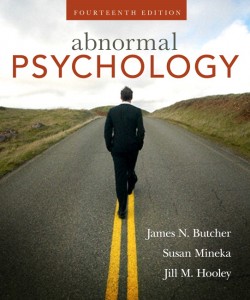
When we experience or perceive challenges to our physical or emotional well-being that exceed our coping resources and abilities, the psychological condition that results is typically referred to as stress
The following quotes, from Abnormal Psychology (Butcher, Hooley and Mineka), outline the basic mechanisms of the human stress-response:
“When we experience or perceive challenges to our physical or emotional well-being that exceed our coping resources and abilities, the psychological condition that results is typically referred to as stress.” (p. 140)
“The amount of stress we experience early in life may also make us more sensitive to stress later on (Gillespie & Nemeroff, 2007). The effects of stress may be cumulative, with each stressful experience serving to make the system more reactive. Evidence from animal studies shows that being exposed to a single stressful experience can enhance responsiveness to stressful events that occur later (Johnson et al., 2002). Rats that were exposed to stressful tail shocks produced more of the stress hormone cortisol when they were later exposed to another stressful experience […] These results suggest that prior stressful experiences may sensitize us biologically, making us more reactive to later stressful experiences.” (p. 141-142)
“Cortisol is a good hormone to have around in case of an emergency. It prepares the body for fight or flight. It also inhibits the innate immune response. This means that if an injury does occur the body’s inflammatory response to it is delayed. In other words, escape has a priority over healing, and tissue repair is secondary to staying alive. This obviously has survival value if you need to run away from a lion that has just mauled you. It also explains why cortisone injections are sometimes used to reduce inflammation in damaged joints. But there is also a downside to cortisol. If the cortisol response is not shut off, cortisol can damage brain cells, especially in the hippocampus (see Sapolsky, 2000). At a very fundamental level, stress is bad for your brain. It may even stunt growth…” (p. 144)
“…stress may cause an overall vulnerability to disease by compromising immune functioning. Psychoneuroimmunology is the study of the interaction between the nervous system and the immune system.” (p.145)
“Evidence continues to grow that the brain influences the immune system and that the immune system influences the brain.” (p. 146)
“Hopeless and helpless attitudes can have devastating effects on organic functioning. For example, a sense of hopelessness accelerates progression of atherosclerosis, the underlying process leading to heart attacks and strokes (Everson et al., 1997). […] Today, many surgeons will delay a major operation until they are convinced that the patient is reasonably optimistic about the outcome.” (p. 149)
“People with a history of depression tend to experience negative events as more stressful than other people do (Havermans et al., 2007). Negative emotions can also be associated with poor health (Kiecolt-Glaser et al., 2002a). […] people with major depression run a greater risk of having a heart attack than people with no history of depression (Pratt et al., 1996). Depression also seems to be associated with increased mortality from all causes in medical inpatients (Herrmann-Lingen et al., 2001). In women, depression appears to heighten the risk for osteoporosis (Michelson et al., 1996), and in men, one prospective study showed that depression at baseline predicted decline in muscle strength over a 3-year period (Rantanen et al., 2000).” (p.149)
References:
Butcher, J., Hooley, J., and Mineka, S. (2010). Abnormal Psychology (14th ed.). “Stress and Physical and Mental Health.” Boston: Allyn and Bacon.


Leave a Reply